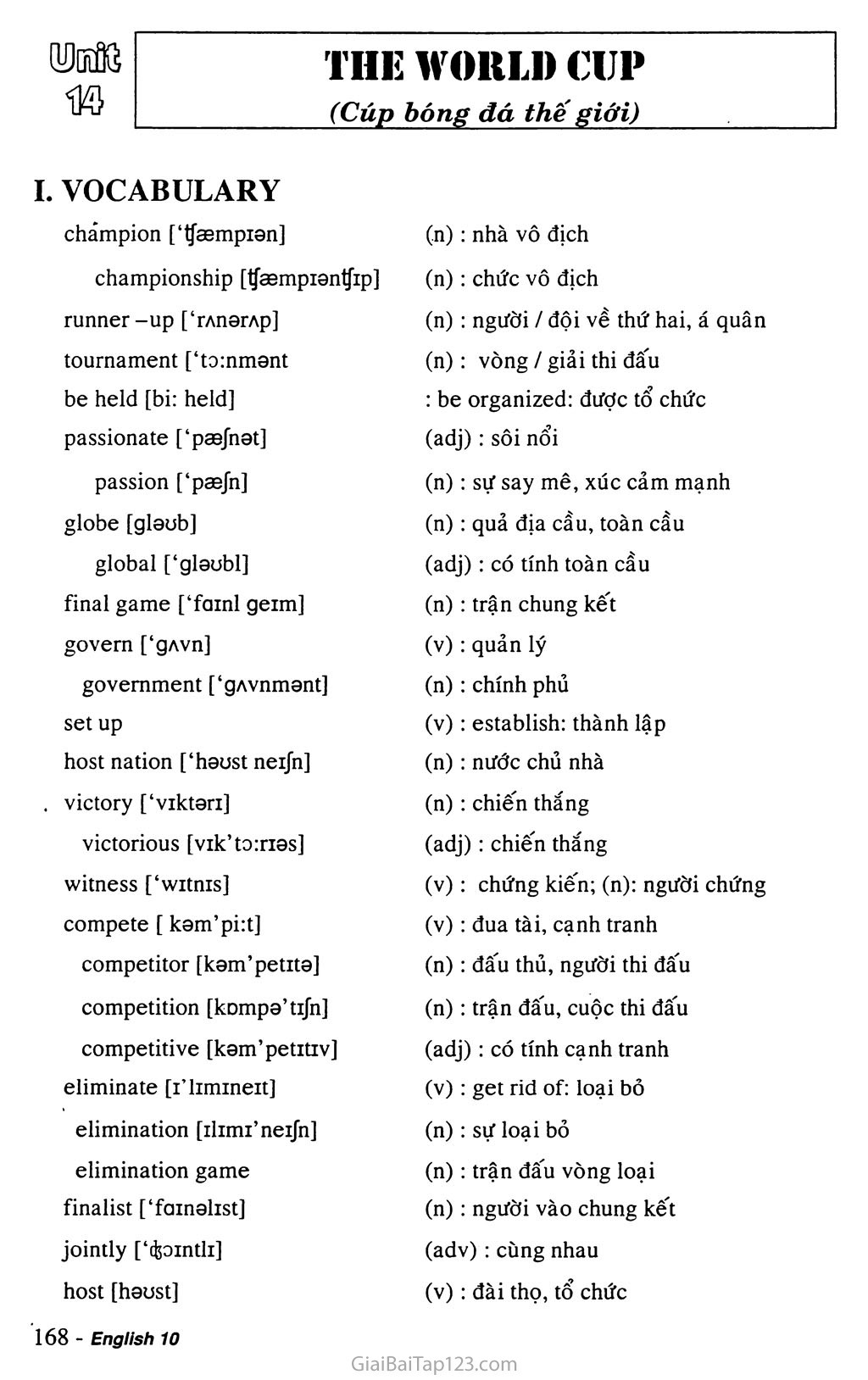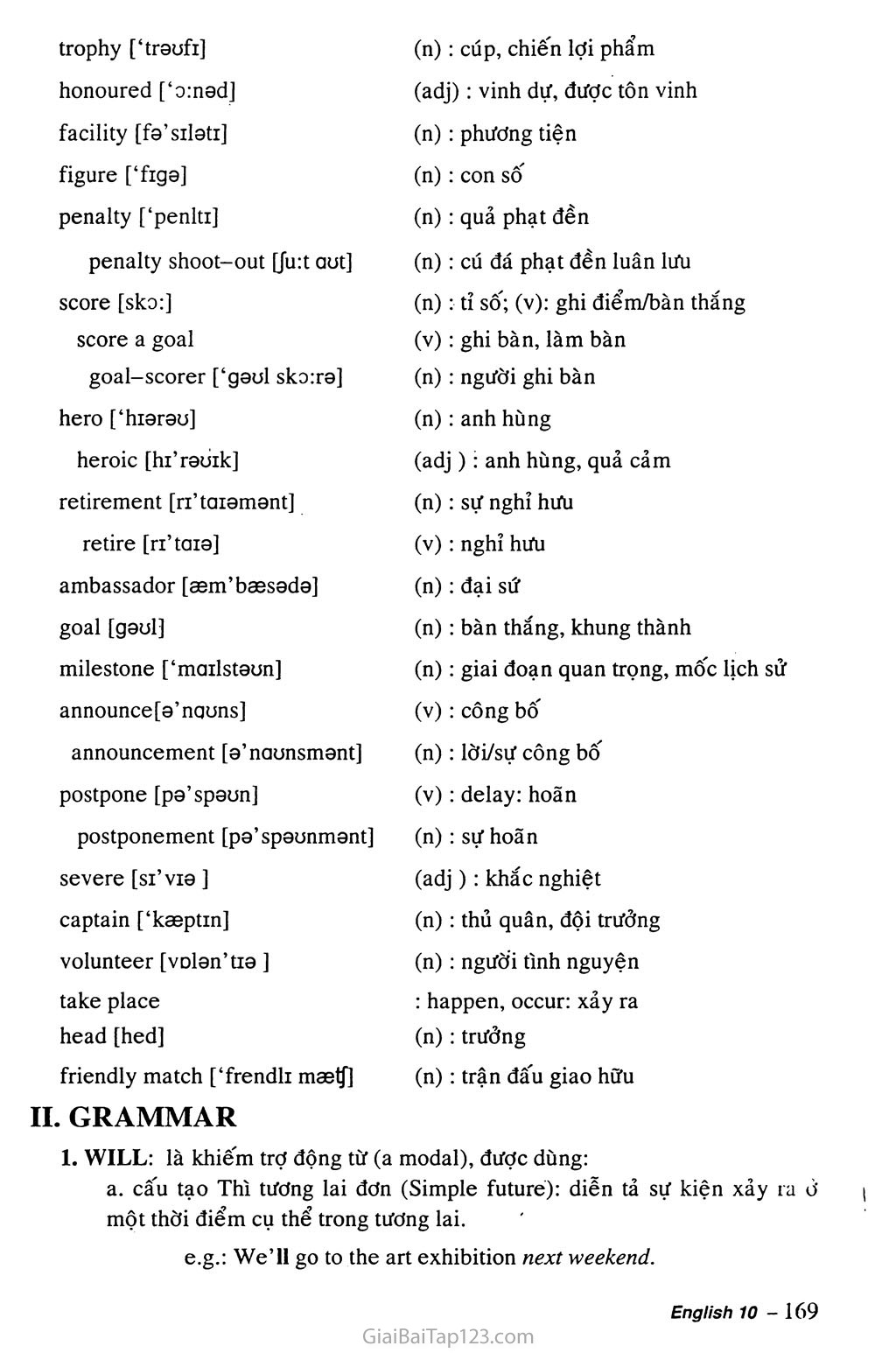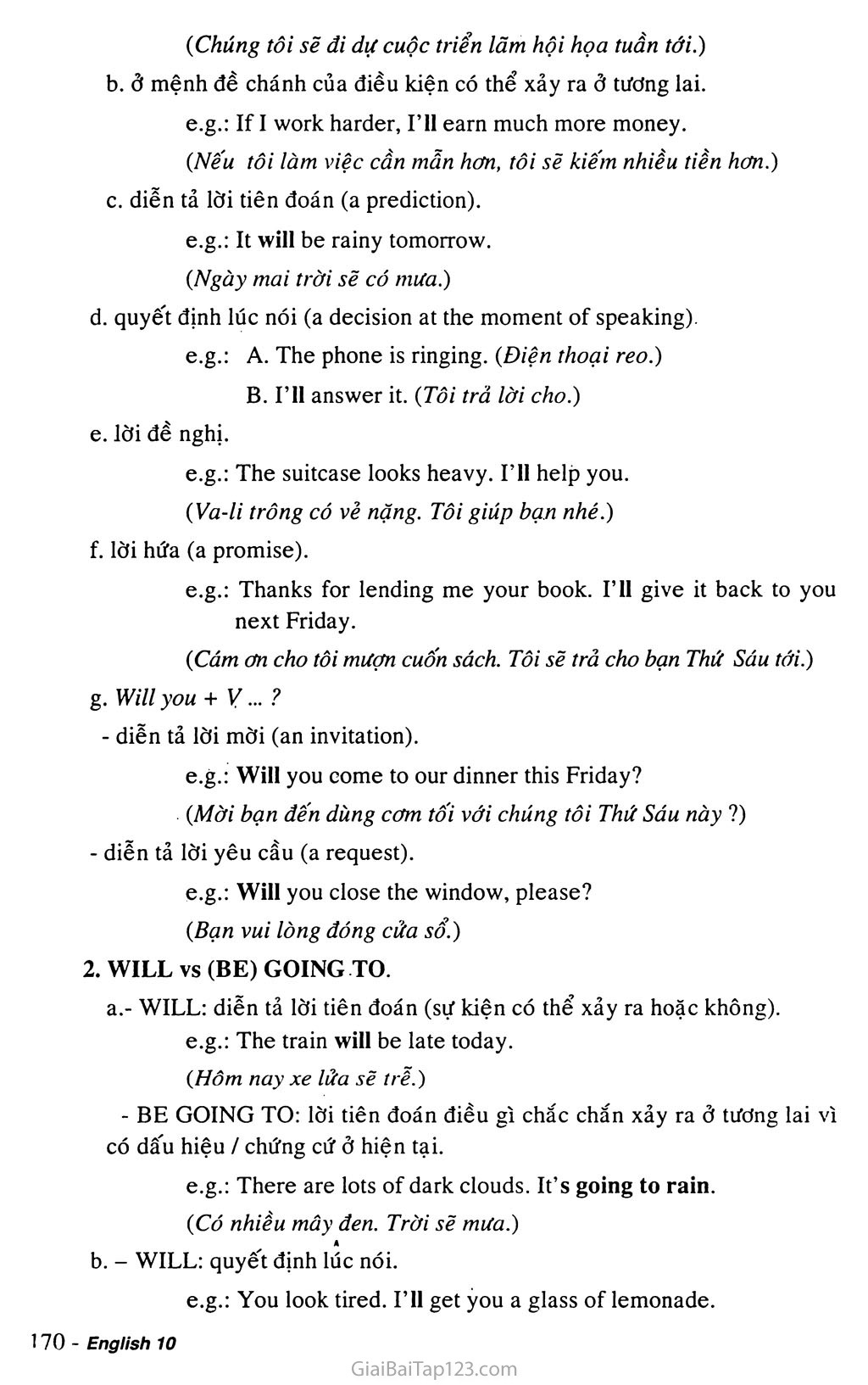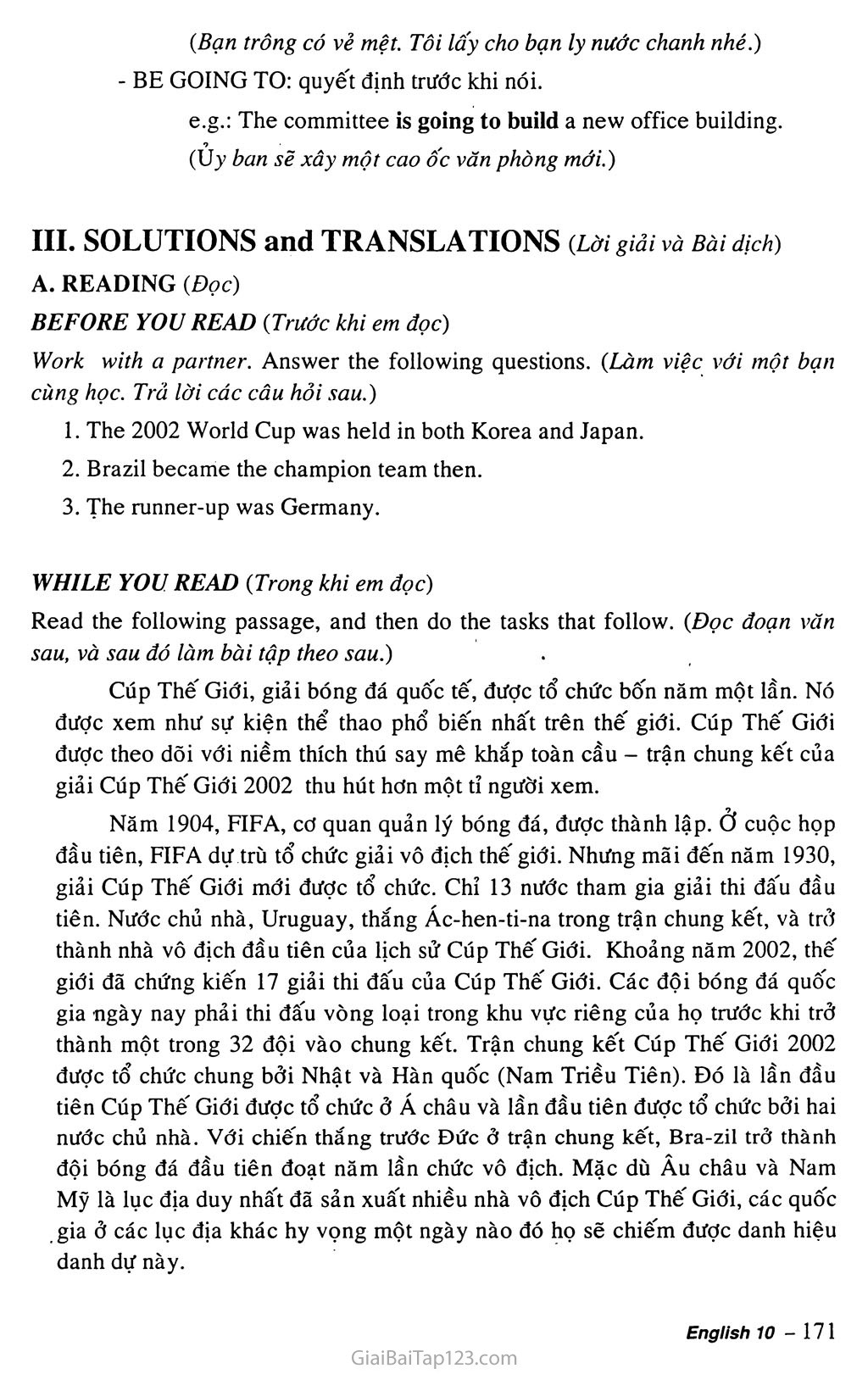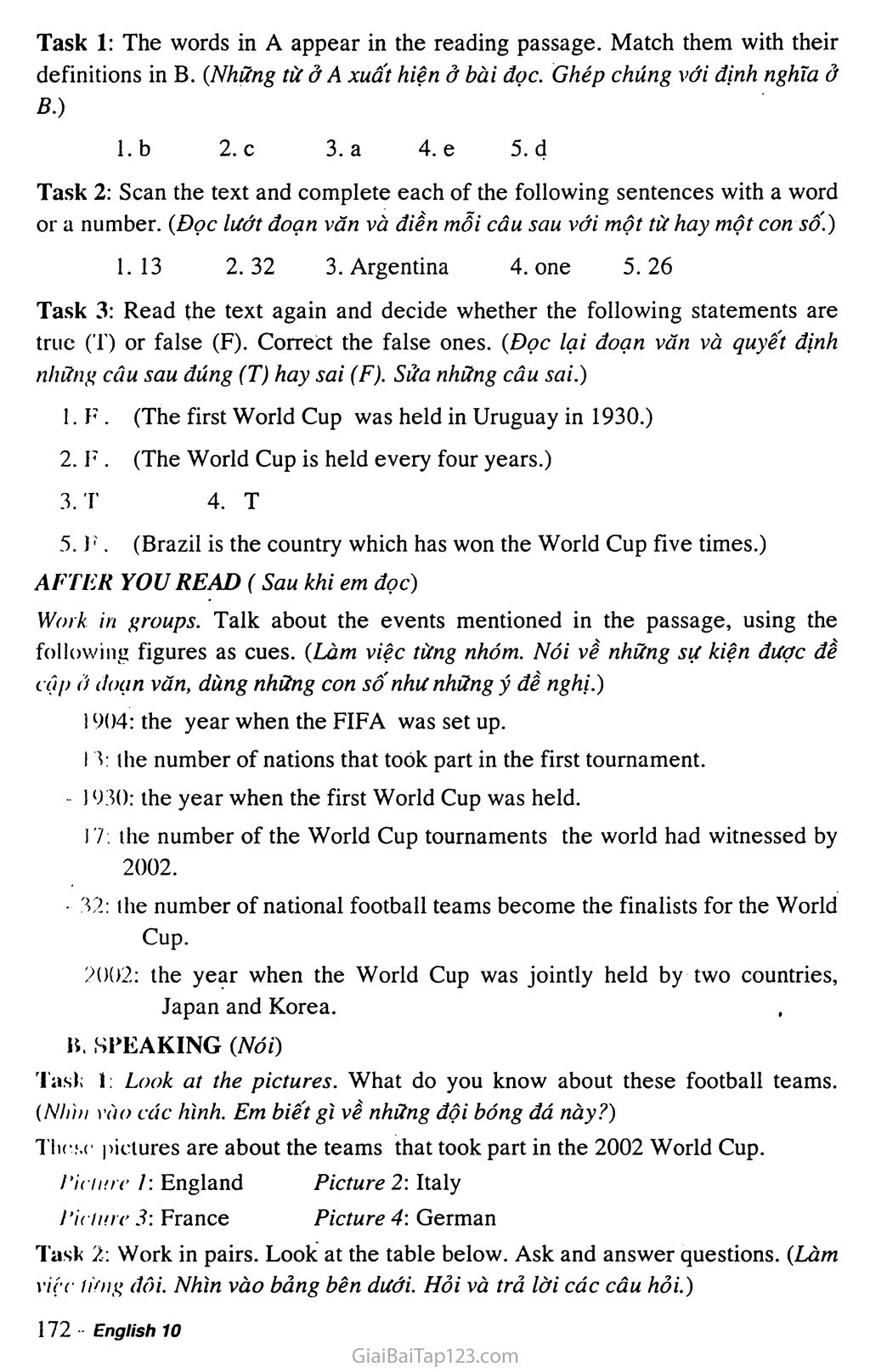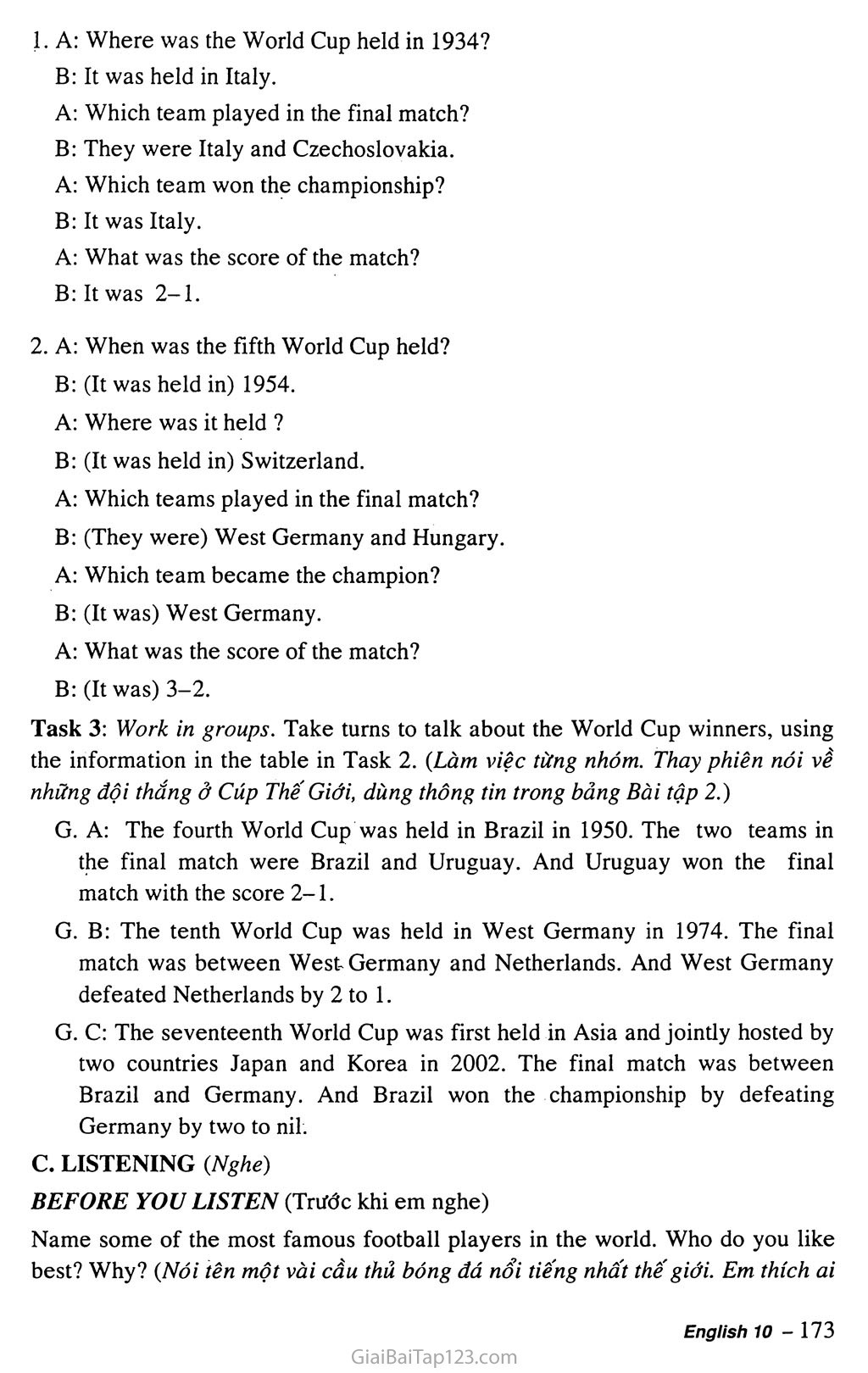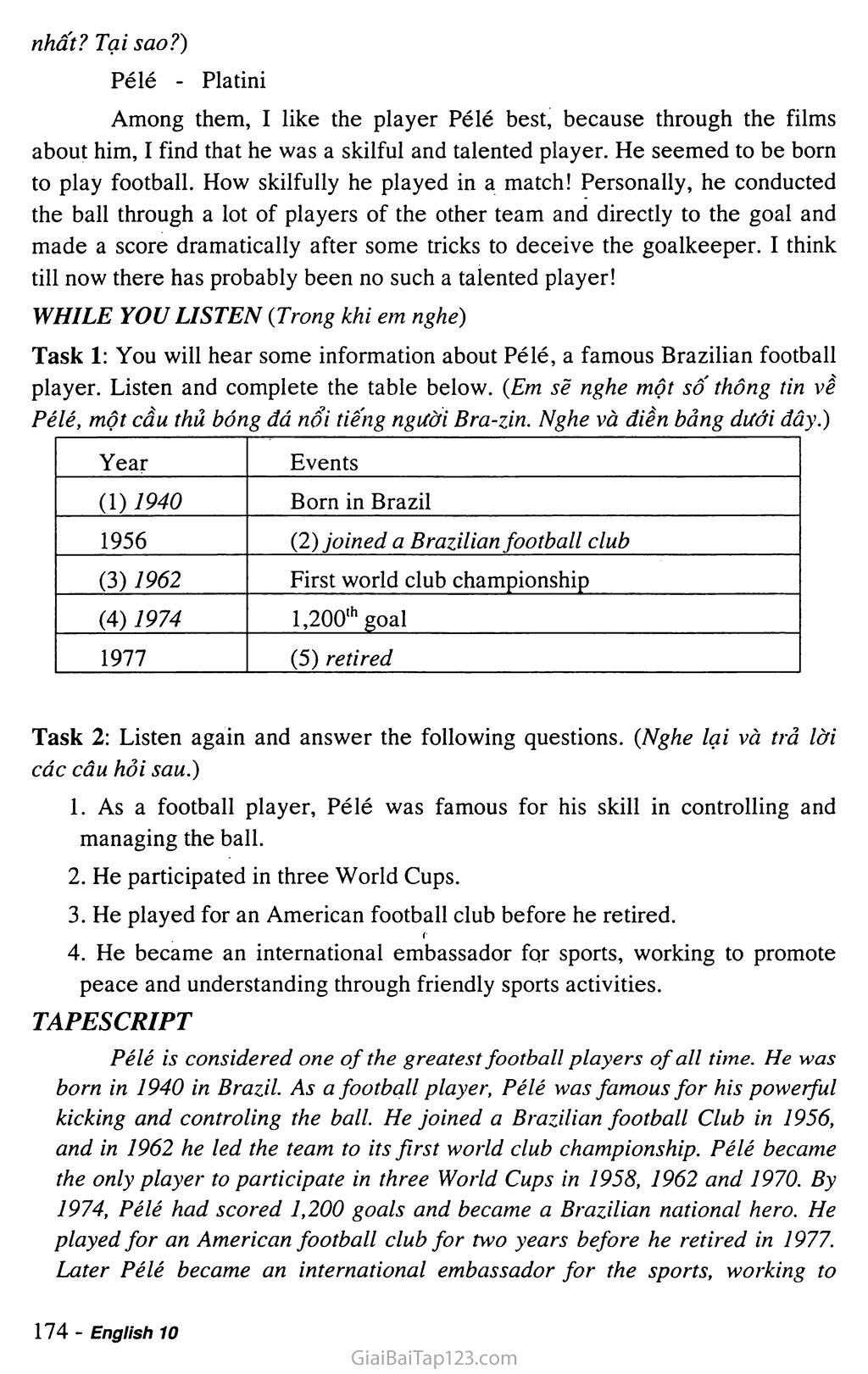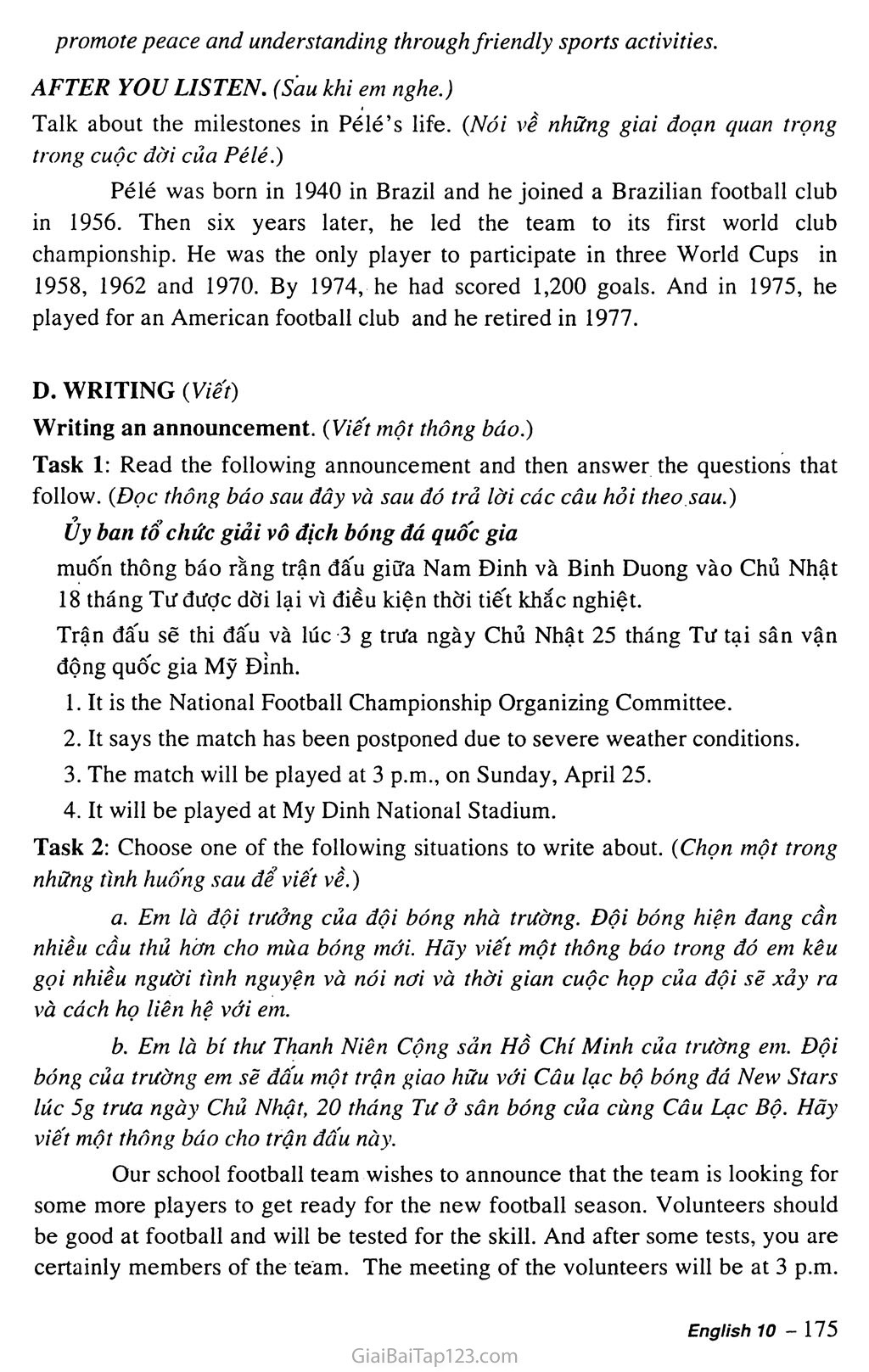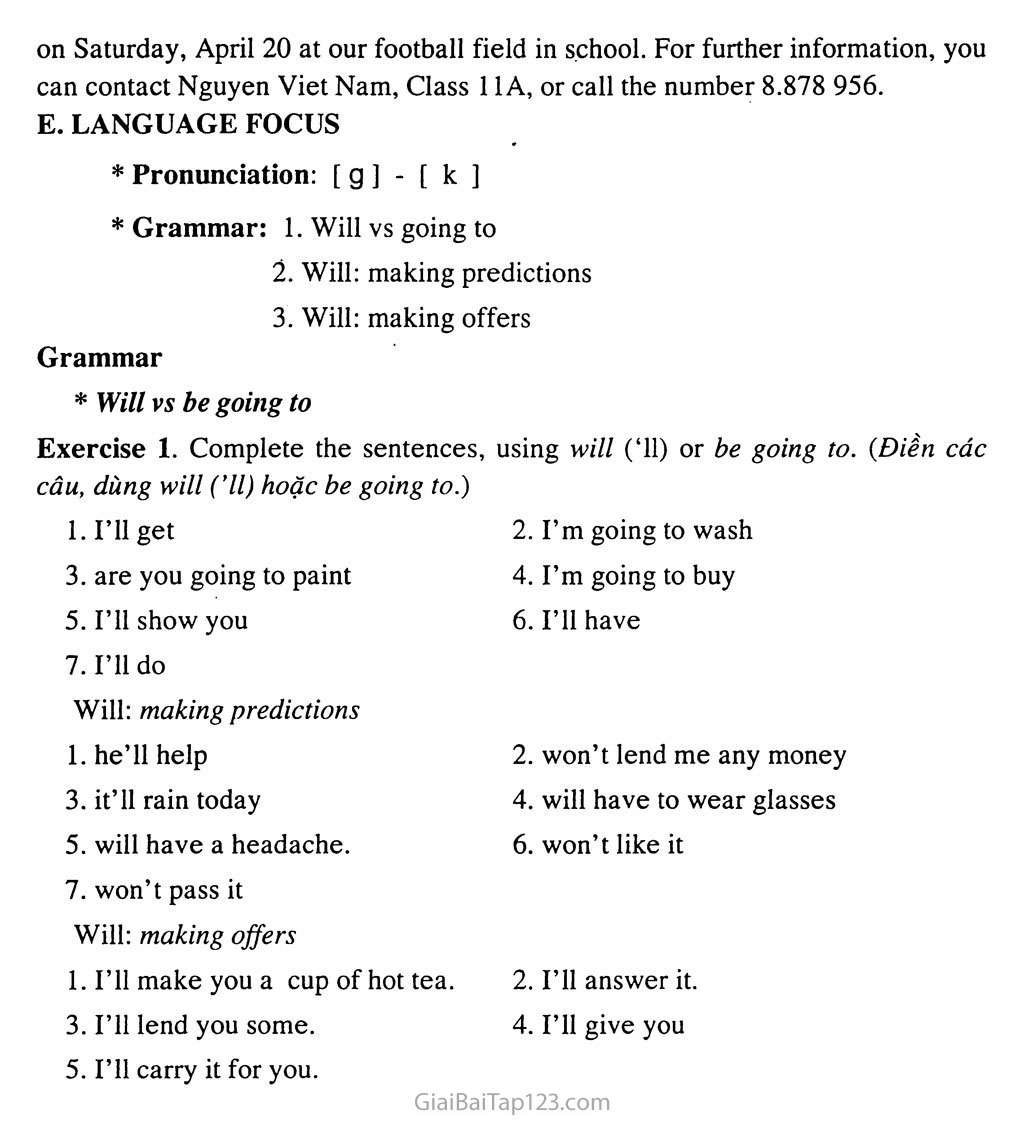Giải tiếng Anh lớp 10 Unit 14: The World Cup
ELŨũũBS
THE WORLD CUP
I. VOCABULARY
champion [‘tfaampian]
championship [tfasmpiantfip]
runner-up [‘rAnarAp] tournament [‘tommant be held [bi: held] passionate [‘pasjnat]
passion [‘paejn] globe [glaob]
global [‘glaubl] final game [‘fainl germ] govern [‘gAvn]
government [‘gAvnmant] set up
host nation [‘haost neijn]
. victory [‘viktari]
victorious [vik’to:rias] witness [‘witnis] compete [ kam’pi:t]
competitor [kam’petita] competition [kDmpa’tiJn] competitive [kam’petitiv]
eliminate [I’limineit] elimination [ilimi’neifn] elimination game
finalist [‘fainalist] jointly [‘(fcointli] host [haost]
(n) : nhà vô địch
(n) : chức vô địch
(n) : người / đội về thứ hai, á quân (n): vòng / giải thi đấu : be organized: được tổ chức (adj) : sôi nổi
(n): sự say mê, xúc cảm mạnh (n) : quả địa cầu, toàn cầu (adj) : có tính toàn cầu (n) : trận chung kết (v) : quản lý
(n) : chính phủ
(v): establish: thành lập
(n) : nước chủ nhà
(n): chiến thắng
(adj) : chiến thắng
(v) : chứng kiến; (n): người chứng
(v) : đua tài, cạnh tranh
(n) : đấu thủ, người thi đấu
(n): trận đấu, cuộc thi đâu
(adj) : có tính cạnh tranh
(v) : get rid of: loại bỏ
(n): sự loại bỏ
(n) : trận đấu vòng loại
(n) : người vào chung kết
(adv) : cùng nhau
(v) : đài thọ, tổ chức
(Cúp bóng đá thế giới)
trophy [‘trsufi]
(n)
cúp, chiến lợi phẩm
honoured [‘o:nsdj
(adj): vinh dự, được tôn vinh
facility [fs’silsti]
(n)
phương tiện
figure [‘figs]
(n)
con số
penalty [‘penlti]
(n)
quả phạt đền
penalty shoot-out Qu:t out]
(n)
cú đá phạt đền luân lưu
score [sko:]
(n)
tỉ số; (v): ghi điểm/bàn thắng
score a goal
(V)
ghi bàn, làm bàn
goal-scorer [‘gsol sko:rs]
(n)
người ghi bàn
hero [‘hisrsu]
(n)
anh hùng
heroic [hi’rsuik]
(adj ) : anh hùng, quả cảm
retirement [ri’taismsnt]
(n)
sự nghỉ hưu
retire [ri’tais]
(V)
nghỉ hưu
ambassador [aem’bssssds]
(n)
đại sứ
goal [gsol]
(n)
bàn thắng, khung thành
milestone [‘mailstsun]
(n)
giai đoạn quan trọng, mốc lịch sử
announce[s’ncjuns]
(V)
công bố
announcement [s’naunsmsnt]
(n)
lời/sự công bô"
postpone [ps’spsun]
(V)
delay: hoãn
postponement [ps’spsunmsnt]
(n)
sự hoãn
severe [si’VIS ]
(adj ) : khắc nghiệt
captain [‘kaeptin]
(n)
thủ quân, đội trưởng
volunteer [vDlsn’tis ]
(n)
người tình nguyện
take place
: happen, occur: xảy ra
head [hed]
(n)
trưởng
friendly match [‘frendli maetn
(n)
trận đấu giao hữu
II. GRAMMAR
WILL: là khiếm trợ động từ (a modal), được dùng:
cấu tạo Thì tương lai đơn (Simple future): diễn tả sự kiện xảy ra ó' một thời điểm cụ thể trong tương lai.
e.g.: We’ll go to the art exhibition next weekend.
(Chúng tôi sẽ đi dự cuộc triển lãm hội họa tuần tới.)
ở mệnh đề chánh của điều kiện có thể xảy ra ở tương lai.
e.g.: If I work harder, I’ll earn much more money.
(Nếu tôi làm việc cần mẫn hơn, tôi sẽ kiếm nhiều tiền hơn.)
diễn tả lời tiên đoán (a prediction).
e.g.: It will be rainy tomorrow.
(Ngày mai trời sẽ có mưa.)
quyết định lúc nói (a decision at the moment of speaking).
g.: A. The phone is ringing. (Điện thoại reo.)
B. I’ll answer it. (Tôi trả lời cho.)
lời đề nghị.
e.g.: The suitcase looks heavy. I’ll help you.
(Va-li trông có vẻ nặng. Tôi giúp bạn nhé.)
lời hứa (a promise).
e.g.: Thanks for lending me your book. I’ll give it back to you next Friday.
(Cám ơn cho tôi mượn cuốn sách. Tôi sẽ trả cho bạn Thứ Sáu tới.)
Will you + V... ?
- diễn tả lời mời (an invitation).
e.g.: Will you come to our dinner this Friday?
(Mời bạn đến dùng cơm tối với chúng tôi Thứ Sáu này ?)
- diễn tả lời yêu cầu (a request).
e.g.: Will you close the window, please?
(Bạn vui lòng đóng cửa sổ.)
WILL vs (BE) GOING TO.
a.- WILL: diễn tả lời tiên đoán (sự kiện có thể xảy ra hoặc không), e.g.: The train will be late today.
(Hôm nay xe lửa sẽ trễ.)
- BE GOING TO: lời tiên đoán điều gì chắc chắn xảy ra ở tương lai vì có dấu hiệu / chứng cứ ở hiện tại.
e.g.: There are lots of dark clouds. It’s going to rain.
(Có nhiều mây đen. Trời sẽ mưa.)
A
b. - WILL: quyết định lúc nói.
e.g.: You look tired. I’ll get you a glass of lemonade.
{Bạn trông có vẻ mệt. Tôi lấy cho bạn ly nước chanh nhé.)
- BE GOING TO: quyết định trước khi nói.
e.g.: The committee is going to build a new office building.
(ủy ban sẽ xây một cao ốc văn phòng mới.)
III. SOLUTIONS and TRANSLATIONS {Lời giải và Bài dịch)
A. READING {Đọc)
BEFORE YOU READ {Trước khi em đọc)
Work with a partner. Answer the following questions. {Làm việc với một bạn cùng học. Trả lời các câu hỏi sau.)
The 2002 World Cup was held in both Korea and Japan.
Brazil became the champion team then.
The runner-up was Germany.
WHILE YOU READ {Trong khi em đọc)
Read the following passage, and then do the tasks that follow. {Đọc đoạn văn sau, và sau đó làm bài tập theo sau.)
Cúp Thế Giới, giải bóng đá quốc tế, được tổ chức bốn năm một lần. Nó được xem như sự kiện thể thao phổ biến nhát trên thế giới. Cúp Thế Giới được theo dõi với niềm thích thú say mê khắp toàn cầu - trận chung kết của giải Cúp Thế Giới 2002 thu hút hơn một tỉ người xem.
Năm 1904, FIFA, cơ quan quản lý bóng đá, được thành lập. ở cuộc họp đầu tiên, FIFA dự trù tổ chức giải vô địch thế giới. Nhưng mãi đến năm 1930, giải Cúp Thế Giới mới được tổ chức. Chỉ 13 nước tham gia giải thi đâ'u đầu tiên. Nước chủ nhà, Uruguay, thắng Ác-hen-ti-na trong trận chung kết, và trở thành nhà vô địch đầu tiên của lịch sử Cúp Thế Giới. Khoảng năm 2002, thế giới đã chứng kiến 17 giải thi đâu của Cúp Thế Giới. Các đội bóng đá quốc gia ngày nay phải thi đâu vòng loại trong khu vực riêng của họ trước khi trở thành một trong 32 đội vào chung kết. Trận chung kết Cúp Thế Giới 2002 được tổ chức chung bởi Nhật và Hàn quốc (Nam Triều Tiên). Đó là lần đầu tiên Cúp Thế Giới được tổ chức ở Á châu và lần đầu tiên được tổ chức bởi hai nước chủ nhà. Với chiến thắng trước Đức ở trận chung kết, Bra-zil trở thành đội bóng đá đầu tiên đoạt năm lần chức vô địch. Mặc dù Âu châu và Nam Mỹ là lục địa duy nhất đã sản xuất nhiều nhà vô địch Cúp Thế Giới, các quốc gia ở các lục địa khác hy vọng một ngày nào đó họ sẽ chiếm được danh hiệu danh dự này.
Task 1: The words in A appear in the reading passage. Match them with their definitions in B. {Những từ Ở A xuất hiện ở bài đọc. Ghép chúng với định nghĩa ở B.)
b 2. c 3. a 4. e 5. d
Task 2: Scan the text and complete each of the following sentences with a word or a number. {Đọc lướt đoạn văn và điền mỗi câu sau với một từ hay một con số.)
1.13 2.32 3. Argentina 4. one 5.26
Task 3: Read the text again and decide whether the following statements are true (T) or false (F). Correct the false ones. {Đọc lại đoạn văn và quyết định những câu sau đúng (T) hay sai (F). Sửa những câu sai.)
F. (The first World Cup was held in Uruguay in 1930.)
F . (The World Cup is held every four years.)
T 4. T
5. F . (Brazil is the country which has won the World Cup five times.) AFTER YOU READ (Sau khi em đọc)
Work in groups. Talk about the events mentioned in the passage, using the following figures as cues. {Làm việc từng nhóm. Nói về những sự kiện được đề cập â đoạn văn, dùng những con sổ như những ý đề nghị.)
1904: the year when the FIFA was set up.
13: the number of nations that took part in the first tournament.
1930: the year when the first World Cup was held.
■ 17: the number of the World Cup tournaments the world had witnessed by 2002.
32: the number of national football teams become the finalists for the World
Cup.
2002: the year when the World Cup was jointly held by two countries,
Japan and Korea.
B, SPEAKING {Nói)
Task I: Look at the pictures. What do you know about these football teams. {Nhìn vào các hình. Em biết gì về những đội bóng đá này?)
These pictures are about the teams that took part in the 2002 World Cup.
Picture I: England Picture 2: Italy
I‘idlire 3: France Picture 4‘. German
Task 2: Work in pairs. Look at the table below. Ask and answer questions. {Làm việc từng dôi. Nhìn vào bảng bên dưới. Hỏi và trả lời các câu hỏi.)
A: Where was the World Cup held in 1934?
B: It was held in Italy.
A: Which team played in the final match?
B: They were Italy and Czechoslovakia.
A: Which team won the championship?
B: It was Italy.
A: What was the score of the match?
B: It was 2-1.
A: When was the fifth World Cup held?
B: (It was held in) 1954.
A: Where was it held ?
B: (It was held in) Switzerland.
A: Which teams played in the final match?
B: (They were) West Germany and Hungary.
A: Which team became the champion?
B: (It was) West Germany.
A: What was the score of the match?
B: (It was) 3-2.
Task 3: Work in groups. Take turns to talk about the World Cup winners, using the information in the table in Task 2. {Làm việc từng nhóm. Thay phiên nói về những đội thắng ở Cúp Thế Giới, dùng thông tin trong bảng Bài tập 2.)
G. A: The fourth World Cup was held in Brazil in 1950. The two teams in the final match were Brazil and Uruguay. And Uruguay won the final match with the score 2-1.
G. B: The tenth World Cup was held in West Germany in 1974. The final match was between West Germany and Netherlands. And West Germany defeated Netherlands by 2 to 1.
G. C: The seventeenth World Cup was first held in Asia and jointly hosted by two countries Japan and Korea in 2002. The final match was between Brazil and Germany. And Brazil won the championship by defeating Germany by two to nil.
c. LISTENING {Nghe)
BEFORE YOU LISTEN (Trước khi em nghe)
Name some of the most famous football players in the world. Who do you like best? Why? {Nói tên một vài cầu thủ bóng đá nổi tiếng nhất thế giới. Em thích ai
nhất? Tại sao?)
Pélé - Platini
Among them, I like the player Pelé best, because through the films about him, I find that he was a skilful and talented player. He seemed to be born to play football. How skilfully he played in a match! Personally, he conducted the ball through a lot of players of the other team and directly to the goal and made a score dramatically after some tricks to deceive the goalkeeper. I think till now there has probably been no such a talented player!
WHILE YOU LISTEN (Trong khi em nghe)
Task 1: You will hear some information about Pelé, a famous Brazilian football player. Listen and complete the table below. (Em sẽ nghe một số thông tin về Pélé, một cầu thủ bóng đá nổi tiếng người Bra-zin. Nghe và điền bảng dưới đây.)
Year
Events
(1) 1940
Born in Brazil
1956
(2) joined a Brazilian football club
(3) 1962
First world club championship
(4) 1974
1,200th goal
1977
(5) retired
Task 2: Listen again and answer the following questions. (Nghe lại và trả lời các câu hỏi sau.)
As a football player, Pélé was famous for his skill in controlling and managing the ball.
He participated in three World Cups.
He played for an American football club before he retired.
He became an international embassador for sports, working to promote peace and understanding through friendly sports activities.
TAPESCRIPT
Pélé is considered one of the greatest football players of all time. He was born in 1940 in Brazil. Â.S' a football player, Pelé was famous for his powerful kicking and controling the ball. He joined a Brazilian football Club in 1956, and in 1962 he led the team to its first world club championship. Pelé became the only player to participate in three World Cups in 1958, 1962 and 1970. By 1974, Pelé had scored 1,200 goals and became a Brazilian national hero. He played for an American football club for two years before he retired in 1977. Later Pelé became an international embassador for the sports, working to
promote peace and understanding through friendly sports activities.
AFTER YOU LISTEN. (Sau khi em nghe.)
Talk about the milestones in Pele’s life. (Nói về những giai đoạn quan trọng trong cuộc đời của Pélé.)
Pélé was born in 1940 in Brazil and he joined a Brazilian football club in 1956. Then six years later, he led the team to its first world club championship. He was the only player to participate in three World Cups in 1958, 1962 and 1970. By 1974, he had scored 1,200 goals. And in 1975, he played for an American football club and he retired in 1977.
D. WRITING (Viết)
Writing an announcement. (Viết một thông báo.)
Task 1: Read the following announcement and then answer the questions that follow. (Đọc thông báo sau đây và sau đó trả lời các câu hỏi theo sau.)
Úy ban tổ chức giải vô địch bóng đá quốc gia
muôn thông báo rằng trận đấu giữa Nam Đinh và Binh Duong vào Chủ Nhật 18 tháng Tưđược dời lại vì điều kiện thời tiết khắc nghiệt.
Trận đâu sẽ thi đấu và lúc 3 g trưa ngày Chủ Nhật 25 tháng Tư tại sân vận động quốc gia Mỹ ĐÌnh.
It is the National Football Championship Organizing Committee.
It says the match has been postponed due to severe weather conditions.
The match will be played at 3 p.m., on Sunday, April 25.
It will be played at My Dinh National Stadium.
Task 2: Choose one of the following situations to write about. (Chọn một trong những tình huống sau để viết về.)
Em là đội trưởng của đội bóng nhà trường. Đội bóng hiện đang cần nhiều cầu thủ hơn cho mùa bóng mới. Hãy viết một thông báo trong đó em kêu gọi nhiều người tình nguyện và nói nơi và thời gian cuộc họp của đội sẽ xảy ra và cách họ liên hệ với em.
Em là bí thư Thanh Niên Cộng sản Hồ Chí Minh của trường em. Đội bóng của trường em sẽ đấu một trận giao hữu với Câu lạc bộ bóng đá New Stars lúc 5g trưa ngày Chủ Nhật, 20 tháng Tư ở sân bóng của cùng Câu Lạc Bộ. Hãy viết một thông báo cho trận đấu này.
Our school football team wishes to announce that the team is looking for some more players to get ready for the new football season. Volunteers should be good at football and will be tested for the skill. And after some tests, you are certainly members of the team. The meeting of the volunteers will be at 3 p.m.
on Saturday, April 20 at our football field in school. For further information, you can contact Nguyen Viet Nam, Class 11 A, or call the number 8.878 956.
E. LANGUAGE FOCUS
Pronunciation: [ g ] - [ k ]
Grammar: 1. Will vs going to
Will: making predictions
Will: making offers
Grammar
* Will vs be going to
Exercise 1. Complete the sentences, using will (‘11) or be going to. (Điền các câu, dùng will (’ll) hoặc be going to.)
I’ll get
are you going to paint
I’ll show you 7. I’ll do
Will: making predictions
he’ll help
it’ll rain today
will have a headache.
7. won’t pass it Will: making offers
I’ll make you a cup of hot tea. 3. I’ll lend you some.
5. I’ll carry it for you.
I’m going to wash
I’m going to buy
I’ll have
won’t lend me any money
will have to wear glasses
won’t like it
I’ll answer it.
I’ll give you

